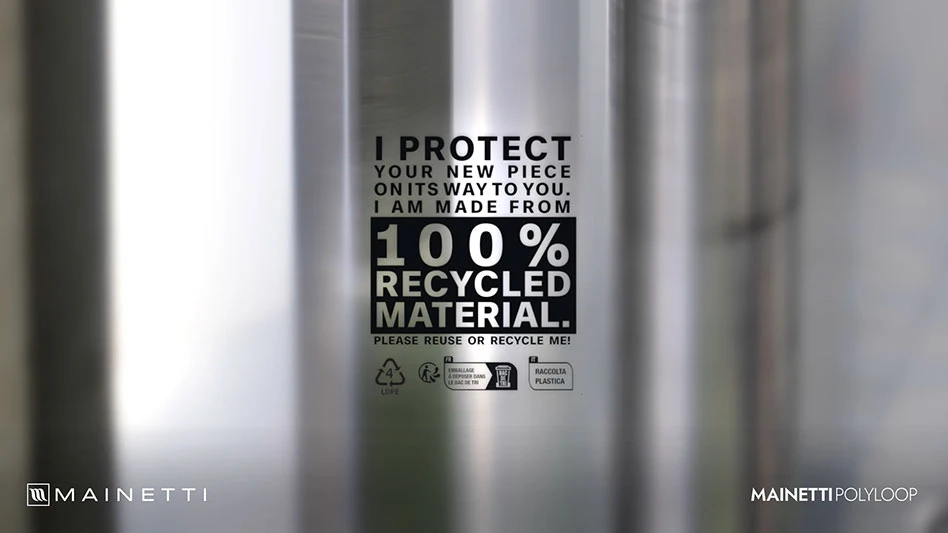 Dennis Denton is no “Johnny Come Lately” to the plastics recycling industry. Denton, the founder of Denton Plastics, Portland, Ore., has been involved in the plastics recycling industry for nearly 30 years, making him a seasoned veteran in an industry that still seems to be in its early stages of development.
Dennis Denton is no “Johnny Come Lately” to the plastics recycling industry. Denton, the founder of Denton Plastics, Portland, Ore., has been involved in the plastics recycling industry for nearly 30 years, making him a seasoned veteran in an industry that still seems to be in its early stages of development.
Denton Plastics has been in operation since 1983. The company handles commodity- and engineering-grade plastics. Of the material the company processes, Denton estimates that 90 percent is sold domestically, which makes the company somewhat unique compared with many other West Coast recyclers who use their proximity to the Pacific Coast to ship material offshore.
“We designed the company in terms of our markets,” Denton says. “We were forced to be able to recycle different types of plastics. We fortunately learned to deal with the different types of plastics, which helped our business model. As we expanded our reach, we started to take in different types of plastics.”
Of the plastic scrap his company handles, Denton says, “Our stuff is compounded into pellets and sold to agriculture, construction [and] packaging—any nonfood-grade, nonmedical-grade product.”
The 60,000-square-foot facility sits on seven acres and employees approximately 42 people full time.
An indirect path
Denton Plastics is unlike many other plastics recycling companies that were spun off of chemical or plastics firms or that include management steeped in the chemical composition of various polymers.
|
AT A GLANCE
|
“Out of college, I bartended,” Denton says. “I then bought a small tavern. I ran that for several years and then got into the wood products business. Eventually I became a partner in that business.”
The wood products company closed in 1980 in part because of the effect of rising interest rates on the housing market and consumer purchases, Denton says.
“I was reading an article in the Wall Street Journal on recycling and on plastics being a new commodity that was starting to take over a lot of operations,” he says. “I bought into a struggling company that was getting started in 1980.”
Denton says he took an interest in the company’s operations and eventually became president. However, because of a falling out between Denton and the company’s other owners, he left. But his interest in the plastics recycling industry remained. “I then started Denton Plastics in 1983. And the rest is history.”
Denton Plastics started humbly as a plastics brokerage firm, Denton says. “As the business grew, I got investors to help me buy equipment,” he says, adding that few processors were available at the time. “I eventually bought [the investors] out in the early 1990s.”
In the early days, the company also tried several methods to capture material for processing, including collecting HDPE (high-density polyethylene), LDPE (low-density polyethylene) and polystyrene from grocery stores. “We had milk jug contests at grade schools,” Denton adds. “We helped start recycling polystyrene foam at McDonald’s restaurants before larger companies came in and took over and found out it wasn’t the easiest thing in the world to recycle.”
New attitudes
Fast forward to today, and Denton says public and manufacturer demand for recycled-content plastics is growing.
“What happened in the beginning was that virgin manufacturers didn’t want to displace their product,” Denton says of the early days of the plastics recycling industry. “They wanted to use [recycled plastics as] window dressing for their products.”
Now, he says manufacturers are embracing recycled plastics. “They are now blending virgin and recycled plastics because you can lower your price point when you are making products. It is very important.”
He adds that rising virgin resin prices helped manufacturers embrace recycled plastics. “They see a monetary gain. They can limit the amount of virgin material.”
Denton says the success of the plastics recycling industry often hinges on the price differential between recycled and virgin material. “The economics have always been a key driver,” he says. “In today’s market, recycled PET (polyethylene terephthalate) pellet prices are slightly higher than virgin, which isn’t good. They have to be as good as virgin and less expensive.”
While competition for material is tough in today’s market, Denton says his company’s willingness to expand the type of plastics it can process is an advantage. “We are digging deeper into the waste stream,” he says.
In addition to retailers, Denton says, “We also are doing work with hospitals to identify certain products that are highly recyclable. With just a little tweak, we can collect them [for recycling] instead of throwing them in the garbage. We are doing it with two things in mind: to get things identified and to create a stream we can process.”
He says Denton Plastics differentiates itself in another important way. “We don’t recycle straight; we have recipes for different types of plastics.”
He adds that like major plastics producers, Denton Plastics has quality control measures in place to ensure consistency in the recycled plastics the company produces.
While expanding the range of plastics Denton Plastics handles has been important, a fundamental goal has been to remain on solid financial footing, especially with the company’s suppliers. “One of the most important things we deal with is timely payment,” Denton says. “You need a good working relationship. There are ebbs and flows with everything. You have to get with partners that you can work with on a long-term relationship.”
New opportunities
More recently, Denton, along with several other investors, opened a PET recycling plant to capitalize on the expansion of Oregon’s beverage container deposit program. The new facility, ORPET Plastics, opened in St. Helens, Ore., in late April 2012.
Pacific PET Recycling LLC, the newly formed joint venture among Denton; Tom Leaptrott, owner of Quantum Leap LLC, a Vancouver, Wash., supplier of packing materials and plastic bags used in the recycling industry; RGN Investments; and the Oregon Beverage Recycling Cooperative (OBRC), is the holding company behind ORPET Plastics.
John Andersen, president of Portland, Ore.-based OBRC, says the facility had been in the planning stages since 2007. “It began when Oregon passed a bill in 2007 to include water and flavored water bottles in the state’s bottle collection program,” he says.
While OBRC has not contributed money to the ORPET plant, its role is to guarantee the supply of PET plastics. That supply will come from Oregon’s bottle recovery program.
Denton says OBRC is an ideal partner on the project because the cooperative includes 99 percent of all the beverage distributors in Oregon. They have the responsibility of collecting all the UBCs, glass and plastic bottles in the state. “They are the only game in town. If they aren’t on your team, you don’t have any game,” Denton says of ORBC.
Key executives at ORPET Plastics are Bruce Sohn, who heads up sales and marketing, General Manager John Samuels and Senior Vice President Teresa Galin.
While ORPET Plastics has been well-received so far, Denton says he was somewhat frustrated by the plant’s slow start. “The biggest problem,” he says, “was that it took so long to go from the planning stage to construction to operation.” This was in part because of the recession and the problems related to the financing industry, Denton adds.
After obtaining financing, the company needed to select a location for the ORPET Plastics plant.
“We found an old building—an old plywood plant that was defunct,” Denton says. “We went to the Port of St. Helens and said we wanted to build. They welcomed us and gave us financial help.”
He says that because of the economic activity that grew out of the construction project, “Every government agency wanted to oversee it. We had a lot of permitting and community meetings where we told them what we were doing. They had to be comfortable with that.”
As if building a new facility in the midst of the recession wasn’t challenging enough, Denton also ran into health problems. “I had a heart pump for 10 months and then a heart transplant. I had attorneys coming to the hospital having me sign papers [related to the new company],” he says.
At full capacity the ORPET Plastics facility will be able to process from 20 million to 30 million pounds of PET plastics per year, which is enough capacity to handle all of the bottles recycled in Oregon, OBRC’s Andersen says.
“That plant is doing very well,” Denton says of ORPET Plastics. As of May, its second month of operation, the plant had already exceeded 1 million pounds of output and made a profit, he adds. “I see nothing but upside potential for that plant because the pull-through demand for recycled PET is enormous.”
 The partners have set aside room for expansion at the ORPET Plastics plant. While the first phase, which opened in early April 2012, can convert recovered plastic bottles into flake, a second phase may be added, depending on market conditions, that would include equipment to produce recycled plastics pellets. A proposed third stage would produce film, Denton says.
The partners have set aside room for expansion at the ORPET Plastics plant. While the first phase, which opened in early April 2012, can convert recovered plastic bottles into flake, a second phase may be added, depending on market conditions, that would include equipment to produce recycled plastics pellets. A proposed third stage would produce film, Denton says.
Despite the potential divergence of business strategies between Denton Plastics and ORPET Plastics, Denton says his role with new the plant is limited to providing market expertise. Denton Plastics will process any extra plastic scrap not used by ORPET, he adds.
Denton says he continues to look forward to the next opportunity in plastics recycling. This has led him to rigid plastics. Denton Plastics is in the process of installing a rigid plastics recycling plant.
Denton Plastics is planning to build a 40,000-square-foot building next to the company’s existing 60,000-square-foot plant in Portland. The new plant will have both grinding and washing equipment to process rigid plastics. If everything goes according to plan, the facility should be operational by the middle of 2013.
Future Challenges
Throughout the last several years, the plastics recycling industry has become much more competitive, Denton says. He sees competition not only from domestic buyers but from overseas buyers as well.
“I used to export 35 percent of our material,” Denton says, adding that there was not enough domestic demand in the United States. Now, domestic and overseas buyers are competing aggressively for recycled material.
“Keeping jobs and keeping raw materials in the United States are important,” Denton says. “That is why we are going to put a rigid plastics plant here right next to our Denton Plastics plant.”
He says he sees good times ahead for the plastics recycling industry in general. “The recycling industry has a strong position in the commodity market because out of necessity comes growth. There is more and more plastic displacing other material as a commodity of choice,” Denton says. “That creates opportunities.”
The author is senior editor of Recycling Today and can be contacted at dsandoval@gie.net.

Explore the November 2012 Issue
Check out more from this issue and find your next story to read.
Latest from Recycling Today
- Washington legislature passes EPR bill
- PureCycle makes progress on use of PureFive resin in film trials
- New copper alloy achieves unprecedented high-temperature performance
- Gränges boosts profits and sales volume in Q1 2025
- RMDAS April figures show recycled steel price setback
- Steer World offers PEX plastic recycling machine
- New recycling grant program launches in Massachusetts
- Tire Recycling Foundation names executive director






